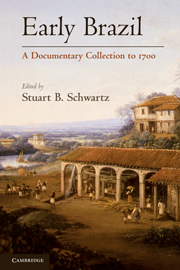Book contents
- Frontmatter
- Contents
- Preface
- A Note on Translation
- A Note on Portuguese Currency, Weights, and Measures
- Maps
- 1 The “Discovery” and First Encounters with Brazil
- 2 The Donatarial System
- 3 Royal Government
- 4 The French Interlude
- 5 Indians, Jesuits, and Colonists
- 6 The World of the Engenhos
- 7 Government and Society in Dutch Brazil
- 8 Burdens of Slavery and Race
- 9 Public and Private Power
- 10 Religion and Society
- 11 Frontiers
- Index
8 - Burdens of Slavery and Race
Published online by Cambridge University Press: 05 June 2012
- Frontmatter
- Contents
- Preface
- A Note on Translation
- A Note on Portuguese Currency, Weights, and Measures
- Maps
- 1 The “Discovery” and First Encounters with Brazil
- 2 The Donatarial System
- 3 Royal Government
- 4 The French Interlude
- 5 Indians, Jesuits, and Colonists
- 6 The World of the Engenhos
- 7 Government and Society in Dutch Brazil
- 8 Burdens of Slavery and Race
- 9 Public and Private Power
- 10 Religion and Society
- 11 Frontiers
- Index
Summary
Slave flight and resistance was a constant feature of Brazilian life. The formation of escaped slave communities called mocambos or quilombos took place everywhere in Brazil, but during the period of the Dutch occupation, a group of escaped slave communities formed into a conglomerate kingdom in a mountainous area in southern Pernambuco in what is today the state of Alagoas. Despite expeditions mounted against this community of Palmares [place of the palms] by the Dutch and then by the Portuguese, the defenders put up an active guerilla defense throughout the seventeenth century. In the 1680s, expeditions of backwoodsmen from São Paulo as well as local troops were used against the escaped slaves, but only in 1694 were the last resistors defeated and their leader, Zumbi, killed. The following letters and accounts provide an idea of the tactics used to combat the fugitives and the threat that a community of escaped slaves seemed to present to the stability of the slave system as a whole.
The War against Palmares: Letter from the Governor of Pernambuco, Ferão de Sousa Coutinho (1 June 1671) on the Increasing Number of Insurgent Slaves Present in Palmares
(Reprinted from Richard Morse, The Bandeirantes [New York: Alfred Knopf, 1968] and translated from Ernesto Ennes, As guerras nos Palmares Coleção Brasiliana, vol. 127 [São Paulo: Companhia Editora Nacional, 1938], pp. 133–4.)
Sire. For some years the Negroes from Angola who fled the rigors of captivity and the sugar mills of this captaincy have established numerous inland settlements between Palmares and the forests, where difficult access and lack of roads leave them better fortified by nature than they might be by human art. These settlements are growing daily in number and becoming so bold that their continual robberies and assaults are causing a large part of the inhabitants of this captaincy who live nearest the mocambos to leave their land. The example and permanence of the mocambos each day induces the other Negroes to flee and escape from the rigorous captivity which they suffer and to find freedom amid fertile land and the security of their own dwellings. One might fear that with these advantages they could grow to such numbers that they might move against the inhabitants of this captaincy, who are so few in relation to their slaves. To avoid this danger, I intend to go to Pôrto Calvo with the entrada of this summer, which is the most suitable place from which to wage this war. From there, using bodies of men that will continually relieve each other, I will order roads opened to the above Palmares by means of which their settlements can be besieged and razed consecutively until all are destroyed and this captaincy is left free of the misfortune which so severely threatens it. For many are the obstacles confronting me in this plan, owing to the difficult terrain and the lack of roads and transportation for provisions, which throughout this State can be carried only on the backs of Negroes since there are no roads for wagons nor even for more than men traveling in single file.…And Your Highness may be sure that this State is in no less danger from the audacity of these Negroes than it was from the Dutch. For in their very houses and plantations, the inhabitants have enemies who can overcome them if they should decide to follow the pernicious example and admonitions of those same rebels, who maintain contact with them, and who now have blacksmith shops and other workshops where they can manufacture weapons, since they already possess some firearms which they took from here. Also, this sertão is so rich in metals and nitrate that it furnishes everything for their defense provided they have the skills, which it may be feared many fugitives do possess who are trained in all the crafts. And because irreparable harm generally results when such dangers are ignored, I decided to take measures against any which might arise from these.
- Type
- Chapter
- Information
- Early BrazilA Documentary Collection to 1700, pp. 264 - 270Publisher: Cambridge University PressPrint publication year: 2009



